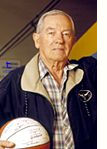 |
|||||||||||||||||
|
|
|||||
|
|
He could have been a captain of industry, commanding boardrooms. He might have owned his own business, overseeing an empire. He could have contributed to any number of successful endeavors; yet, Harley J. Redin ('42, '50 M.S.) chose to be a coach, ruling over a basketball court. His reign was impressive. His innovations changed the rules and energized the game. Redin graduated from North Texas in 1942 with a bachelor's degree in business administration. Then after serving as a bomber pilot in World War II, he returned to North Texas to complete a master's degree in physical education. His education, experience and natural leadership abilities helped to propel him into the spotlight as one of the nation's all-time greatest women's basketball coaches.
A winning combination Early sports experiences and a fervor to reform the game were Redin's winning combination. During 18 years (1955-1973) of coaching the Wayland Baptist College Flying Queens in Plainview, Texas, he amassed a 431-66 record, two undefeated seasons, six national Amateur Athletic Union championships, seven runner-up appearances in the national championship game and a 76-game winning streak. Redin was recognized in Sports Illustrated as one of the 50 greatest sports figures from Texas. The Flying Queens' coach was honored in the December 1999 issue along with such well-known sports figures as Ben Hogan, Nolan Ryan and Tom Landry. He had the distinction of being the only basketball coach on the list. "Harley Redin is one of the most important figures in the history of women's basketball," says Marsha Sharp, one of Redin's former Flying Queens players, who is in the midst of a successful career as coach of women's basketball at Texas Tech University. "There are many female basketball players who enjoy great opportunities and a more exciting game because of his vision of what the sport should be," she says.
Picking up the pace Sports fans can thank Redin for the entertaining, up-beat game that is women's basketball of today. Redin explains that when he began coaching, the rules of the women's game were restrictive and the game was sluggish. Instead of playing a full-court game, women were confined to half courts. He influenced generations of basketball players and coaches across the nation by lobbying to change these rules. His mission was to get women in the United States to play by the international rules of the women's game. "During my early years of coaching, women outside the United States played by the same rules as the men," says Redin. "It was difficult for our players to play one way at home and another way in international competition." While serving on the U.S. Olympic National Women's Basketball committee and the AAU rules committee, Redin used his influence to change the rules from three dribbles (on a half court) to an unlimited dribble; from a no-time-limit shoot to a 30-second limit; and from a six-player game with a roving player to a traditional five-player, full-court game. He was also among the first to use the full-court defensive press and a fast-breaking offense.
True success Not only was Redin instrumental in changing the rules, he also had a great influence on his players. By opening the door for high-quality women's competition, he played a major role in increasing scholarship opportunities. "One thing Harley is most proud of is the fact that he helped so many women attend college and become successful," says Alice "Cookie" Barron, another former Flying Queens player. "I would have never gone to college without the Wayland scholarship that he provided." The Flying Queens coach impressed upon his teams the advantage of an even-tempered approach. As a former women's high school basketball coach, Barron understands the importance of Redin's example of fairness and sportsmanship. "The game was based on skill, which was part of the honor factor," says Barron. "If you got beat, it was because the other team's skills were better — no excuses and no one to blame." Redin was able to realize his own vision to provide the opportunity for more women to play a competitive game. He says the most inspiring part of his career was "getting to coach all of those great athletes." For his
outstanding achievements in women's basketball, Redin was inducted
into the first class of the Women's Basketball Hall of Fame in Knoxville,
Tenn., in 1999. Nan Elrod, director of programs at the hall of fame,
says, "Harley Redin was selected because he truly made a mark on
the game." |
||||

